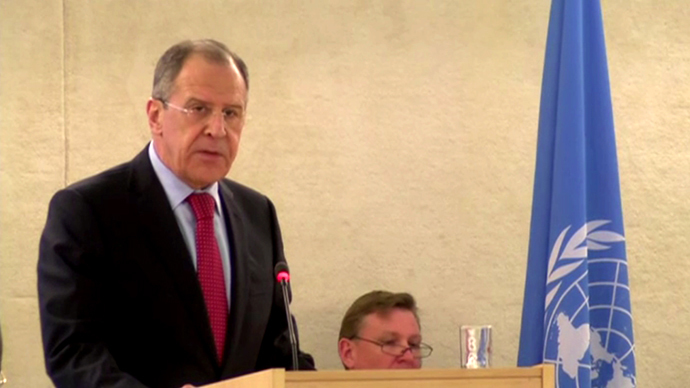Russian option to send troops is only to protect human rights - Lavrov

Russia’s decision to allow troops to be sent to Ukraine is meant to deter radicals from using violence in the country and to facilitate reconciliation, said Russian Foreign Minister Sergey Lavrov.
He dismissed the interpretation of the move by Western powers as an act of aggression on the part of Moscow and called on the West to stop using human rights as a pretext for pursuing geopolitical goals.
“I reiterate, we are talking here about protection of our citizens and compatriots, about protection of the most fundamental of the human rights – the right to live, and nothing more,” Lavrov told on Tuesday the UN Council on Human Rights in Geneva.
“Those who try to interpret the situation as an act of aggression, threaten us with sanctions and boycotts, are the same partners who have been consistently and vigorously encouraging the political powers close to them to declare ultimatums and renounce dialogue, to ignore the concerns of the south and east of Ukraine and consequently to the polarization of the Ukrainian society,” the minister charged.
Lavrov suggested that Russia would not use its military force for
geopolitical gains under a pretext of protecting human rights.
“Human rights are too important to make it a bargaining chip
in geopolitical games, to use it to impose one’s will on others;
less so to instill regime change,” he warned. “An
intervention through force under a pretext of protecting
civilians causes the opposite, multiplies the suffering of
peaceful citizens, and strips them of their fundamental human
right - the right to life.”
Lavrov said Russia’s position on the Ukrainian debacle is that
the self-proclaimed government in Kiev must comply with its
obligations under an agreement, signed on February 21 by
President Yanukovich, opposition leaders and foreign ministers of
Germany, France and Poland. Yanukovich held his end of the
bargain, but the opposition didn’t, the FM stressed.
“The opposition did nothing. The illegal arms have not been
relinquished, the government buildings and streets of Kiev have
not been completely freed, radicals maintain control of cities.
Instead of a promised national unity government a ‘government of
the victors’ has been created,” he said.
Lavrov called on Kiev to return to the February 21 agreement and conduct a constitutional reform, which would include participants from all regions of Ukraine. The reform should be approved in a nationwide referendum, he said.
Following the ousting of Viktor Yanukovich in a wave of violent street protest, the opposition-controlled parliament appointed a new government. Ten Ukrainian regions saw massive protest rallies against the developments in the capital. Several of them, including Crimea, announced that they would not take orders from the new government and replaced appointed governors with elected representatives.
Moscow reserved the option to send troops to Ukraine, if it were required to protect civilians in the defiant regions. Kiev called the move “a declaration of war” and announced military mobilization. The US threatened Russia with political and economic isolation.












